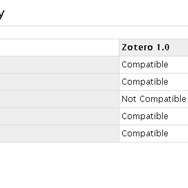
#Mendeley versus zotero software#
Just as Zotero’s citation management functionality is a means to an end, so is licensing and developing the software as FLOSS. From my perspective, FLOSS in and of itself is a fairly unpersuasive argument for using Zotero, akin to knee-jerk calls to “Buy American!” in the 1980s, when the USA still did some manufacturing.īuying American and using FLOSS might make one feel some sense of moral superiority, but at the end of the day can those feelings still paper over our sense of existential dread when faced with driving to work in our crumbling K-cars or cobbling together a dissertation with shitty research software? Many of Zotero’s most dedicated users have championed the software in the name of FLOSS, but this line of argument frequently falls on deaf ears, or even ears that are conditioned to reject FLOSS as somehow anti-market or anti-capitalist. Here researchers could begin to do truly remarkable and new things with their evidence.Ī few commenters, as well as Fred, tried to shift the discussion toward the issue of cost and openness, and in particular to Zotero’s status as free/libre open source software (FLOSS).


As Fred Gibbs notes, however, “while citation formatting is one major reason to use bibliographic software, it isn’t necessarily the only or even primary reason, especially in the humanities.” Zotero’s citation functionality was always imagined merely as bait: by providing this labor-saving functionality, Zotero would encourage each user to move her research into what amounted to a fully searchable and shareable relational database that could be subjected to text mining and other analysis. Endnote,” where the debate centered mostly around issues of citation fidelity. Brian Croxall recently lit up the comment feed at the Chronicle with his ProfHacker comparison of “ Zotero vs.


 0 kommentar(er)
0 kommentar(er)
